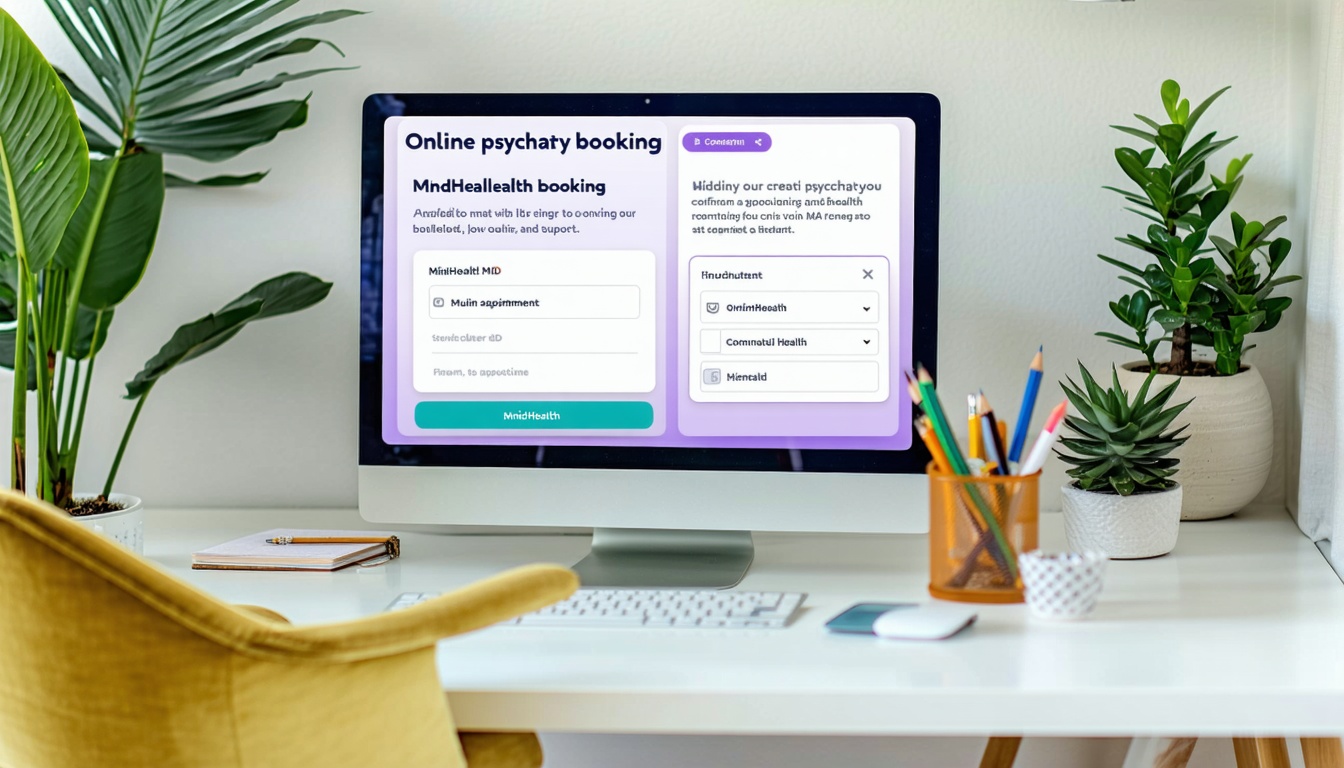MAT for alcohol dependency can be a powerful path toward feeling healthy and in control of your life again. Whether you’re just exploring treatment options or you’ve already tried different therapies, you might be wondering if medication-assisted treatment is truly the right fit. Talking to a trained professional can help you separate fact from rumor, and that’s precisely where MindHealth MD shines. With telehealth psychiatry, MAT solutions, and transcranial magnetic stimulation (TMS) services, you can tap into specialized help—on your own schedule and from the comfort of your home. Let’s walk through what alcohol dependency involves, how MAT supports your recovery, and why MindHealth MD could be your partner in healing.
Recognize alcohol dependency
Alcohol dependency often begins silently. It may start as casual social drinking or a stress reliever after work, and then gradually takes a stronger hold on your mind and body. Before you know it, you may find yourself unable to cut back, despite seeing the negative effects pile up. According to the Mayo Clinic [1], this pattern isn’t just “heavy drinking,” but a potential alcohol use disorder—marked by cravings, withdrawal symptoms, and difficulty controlling use.
Warning signs and risk factors
- Struggling with withdrawal: If you feel shaky, anxious, or nauseated when you skip alcohol, that suggests your body has become dependent.
- Craving more: Over time, you might need more alcohol to reach the same effect.
- Hidden drinking: Some people keep their usage a secret or fib about how much they’re actually consuming.
- Social fallout: Maybe your relationships feel strained or you’re missing key responsibilities across personal and professional settings.
- Health decline: Binge drinking can damage your heart, liver, and other organs, while also lowering overall immunity.
Many factors contribute to alcohol dependency, including genetics, family history, cultural norms, and how your brain responds to alcohol’s temporary “feel-good” effects. Teen or young adult drinking is also a recognized risk, but alcohol problems can take root at any age [1].
Why early intervention matters
Even mild alcohol issues may escalate into deeper dependency. The earlier you step in, the more easily you can regain control before things spiral. If you catch those early red flags—like feeling you just “have to” have a drink each day—consider reaching out for help. Resources like substance use psychiatry service exist to help you pause and regroup before negative patterns become tangled in every aspect of your life.
Explore MAT approaches
Medication-assisted treatment (often called MAT) is designed to help you gradually reduce your alcohol intake or sustain long-term sobriety. While there’s no magic pill, certain medications can ease withdrawal symptoms, manage cravings, or discourage you from drinking. With professional guidance and a comprehensive plan, MAT for alcohol dependency can put real muscle behind your determination to quit or cut back.
Key medications for alcohol use disorder
-
Naltrexone
Naltrexone blocks opioid receptors in your brain, influencing how you experience alcohol’s effects. Studies suggest that it can reduce heavy drinking days and increase the likelihood of abstinence [2]. One caveat is that naltrexone also blocks opioid-based pain relief, which is something to keep in mind if you might need strong painkillers. -
Acamprosate (Campral)
This medication interacts with certain brain chemicals (such as gamma-aminobutyric acid, or GABA) to reduce cravings and the emotional distress that may accompany early sobriety. Often, acamprosate is started once you’ve detoxed from alcohol, and it can be continued for several months [2]. It’s not a quick fix, but rather a steady support that helps your mind adjust to functioning without alcohol. -
Disulfiram (Antabuse)
Used mainly as a strong deterrent, disulfiram triggers unpleasant reactions—like flushing, nausea, and headaches—if you drink even a small amount of alcohol [2]. It works best if you have a high motivation to stay sober and you’re vigilant about avoiding hidden alcohol sources (like certain mouthwashes or sauces). -
Nalmefene (Selincro)
Similar to naltrexone, nalmefene blocks certain opioid receptors and is designed to manage cravings [2]. It’s typically prescribed for people who are still drinking but aim to reduce their intake.
Each medication has its own pros, cons, and side effects, so your psychiatrist will tailor a plan that makes sense for your lifestyle, medical history, and treatment goals. At MindHealth MD, you can book a telehealth mat consultation to explore these options without worrying about traffic or long waiting rooms.
Serving as part of a bigger picture
It’s important to remember that MAT works best in combination with therapy and lifestyle adjustments. Techniques like cognitive behavioral therapy (CBT) and structured counseling help you untangle the motives behind your drinking—whether it’s stress relief or an attempt to cope with emotional pain. When you support MAT with talk therapy, you’re learning new coping skills that last well beyond the medication course. This is also when tapping into other services, such as medication assisted treatment or TMS therapy, might amplify results.
Use family support
Family can play a major role in both the development of and recovery from alcohol dependency. Sometimes, loved ones unintentionally enable problematic drinking by downplaying the issue or trying to protect you from consequences. On the other hand, unwavering family support can encourage honesty, accountability, and faster engagement in treatment.
The impact on your household
Research indicates that families often shoulder extra responsibilities—financial, emotional, and logistical—when one member has an alcohol use disorder [3]. Children, spouses, and siblings may experience psychological stress and feel pressured to keep things functional despite the chaos. Over time, this stress can translate into their own mental health struggles. If you’re the one grappling with dependency, it’s easy to underestimate how deeply your loved ones are affected.
Embracing family-focused therapy
Family-focused approaches, such as Alcohol Behavioral Couple Therapy (ABCT) or Behavioral Couples Therapy (BCT), encourage communication skills, boundary-setting, and shared goals [3]. These programs help you and your partner or family identify patterns that contribute to addictive behaviors, then replace them with healthier alternatives. Family members often learn how to reinforce positive progress and avoid enabling.
When you feel like everyone is pulling in the same direction, the journey to sobriety becomes easier. MindHealth MD can connect you to family-based therapy resources through convenient online sessions, so you don’t all need to travel across town or juggle multiple schedules.
Enabling vs. empowering
The term “enabling” refers to actions that shield individuals from the consequences of their substance use. While it typically comes from a place of love, it inadvertently allows a destructive cycle to continue. Instead, empowering each other means shifting the focus toward consistent accountability, open-minded communication about treatment, and self-care for both you and your family members. If you sense a pattern of enabling, reaching out for professional advice can help everyone reset boundaries and build a healthier dynamic.
Consider telehealth solutions
Making the decision to address alcohol dependency is big, but constantly commuting to appointments can be intimidating. Telehealth psychiatry helps you meet with professionals via videoconferencing or phone calls from the comfort of your own couch. This user-friendly option has become a game-changer for people who need mental health care but struggle with transportation, time constraints, or local availability.
Benefits of online care
- Flexibility in scheduling: You can more easily fit sessions around a busy work routine or family obligations.
- Ease of access: Rural areas often lack specialists, leading to long wait times or excessive travel. With telehealth, you get immediate direction and care.
- Lower stress: For people who find medical settings daunting or stigmatizing, online consultations can be more relaxed.
- Customized approach: Telehealth providers can integrate MAT follow-ups, therapy appointments, and check-ins so you have a cohesive plan.
If you’re ready to give it a try, you could schedule a virtual psychiatry session or set up a telepsychiatry appointment with MindHealth MD. This might be especially attractive if you have a lot on your plate and need your support structure close by during each session.
Incorporating TMS in your journey
Transcranial magnetic stimulation (TMS) is a noninvasive procedure used primarily for treatment-resistant depression, but it also shows promising benefits for certain aspects of addiction. TMS involves a magnetic coil placed near the forehead to deliver targeted pulses to brain areas linked to mood regulation [4]. While TMS isn’t a universal solution for everyone with alcohol dependency, it can complement MAT and therapy. If you’re curious, you could schedule tms treatment or talk with transcranial magnetic stimulation providers at MindHealth MD for a thorough evaluation.
Choose MindHealth MD
Tackling alcohol dependency demands expert guidance plus compassion, especially when you’re juggling everyday responsibilities. At MindHealth MD, you’ll find a full suite of services—from same day psychiatric evaluation to treatment resistant depression care—all geared toward making your mental health journey more manageable.
A holistic approach
MindHealth MD isn’t just about prescribing medication. It’s about looking at the “big picture” of your wellness. That means:
- Comprehensive assessment: A thorough evaluation of your mental, emotional, and physical health to understand how alcohol use is affecting your entire life.
- Dual-diagnosis support: If you have a co-existing condition, such as anxiety or PTSD, you can consider co occurring disorders treatment.
- Tailored medication plans: You won’t get a cookie-cutter prescription. Instead, you’ll receive customized recommendations based on a careful review of your unique needs.
- Family involvement: If you’d like, your loved ones can join sessions to learn strategies for healthy communication and collaborative progress.
Convenience and accessibility
If you prefer receiving care online, you can book an online psychiatry booking and skip the waiting room entirely. If you’re local and would rather meet face-to-face, you can do that too. Plus, insurance accepted psychiatry helps ensure you can focus on your wellness instead of worrying about how to afford it.
Continuous support
Even after your initial assessment, you might want to maintain close communication with your care team. Psychiatric medication management appointments track how you’re responding to MAT or other interventions, and they adjust dosages or switch approaches if needed. By avoiding long gaps between appointments, you boost the odds of maintaining momentum.
Review frequently asked questions
Below are five frequently asked questions about MAT for alcohol dependency, along with clear answers that might guide your next steps.
-
What exactly is MAT for alcohol dependency?
MAT stands for medication-assisted treatment, a combination of prescription medication and counseling designed to reduce cravings, minimize withdrawal, and support long-term success. This approach recognizes that both the physical and psychological aspects of alcohol dependency need attention. -
How long do I need to take MAT medication?
The duration depends on your personal situation. Some medications, like acamprosate or naltrexone, are prescribed for several months to a year, while others like disulfiram require ongoing vigilance as long as you want that extra layer of deterrence. Your doctor will reevaluate throughout treatment to ensure it still matches your current needs. -
Will MAT alone “cure” my alcohol dependency?
MAT can be hugely helpful, but it works best alongside therapy, peer support, lifestyle changes, and sometimes family interventions. Alcohol dependency is complicated—your body, mind, and social circles all play roles—so a comprehensive game plan is key. -
Can I still drink a little while on MAT?
Medications like disulfiram can cause immediate bad reactions if you drink. Others, like naltrexone, may reduce cravings but don’t guarantee you won’t relapse. You want to aim for full abstinence or, based on your plan, at least significant reduction. Discuss your goals openly with your care provider so you know exactly how the medication works and what to expect. -
How do I get started at MindHealth MD?
If you think MAT is right for you, the first step is to contact MindHealth MD for an assessment. You can book psychiatric appointment or explore an immediate psychiatry appointment. You’ll work with a qualified mental health professional to figure out what medication, therapy approach, or combination of treatments makes the most sense.
Plan your next steps
Taking action is often the hardest step, but it’s also the most empowering. If you sense that alcohol has gained too much control over your life, consider investigating MAT for alcohol dependency further. You’re not alone, and there are real solutions that can help you feel balanced again.
MindHealth MD offers a safe and confidential environment for sharing your concerns, learning about available medications, and discussing whether telehealth or in-person care best suits you. If you decide that TMS might be a helpful layer to your therapy, you can easily schedule tms treatment and ensure every aspect of your wellness is addressed.
Most importantly, remember that recovery looks different for everyone. Some people see immediate improvements, while others need more time, adjustments, or added therapies like family counseling. No matter your path, you deserve support that’s personalized, compassionate, and 100 percent focused on helping you heal. At MindHealth MD, the goal is to walk that path with you—one step at a time.
If you’re ready to learn more, you can explore an initial medication assisted treatment consultation or telehealth mat consultation. You’ll get a chance to ask questions, share your concerns, and start crafting a plan that respects your lifestyle and personal goals. After all, finding freedom from alcohol dependency is absolutely within reach—you just need the right blend of care, medication, and steady support to make it happen.
References
- (Mayo Clinic)
- (NHS)
- (PubMed Central)
- (NCBI Bookshelf)








